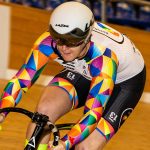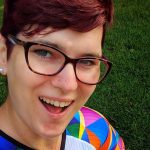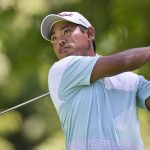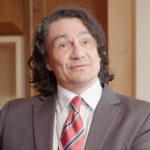Podcasts: Rachel McKinnon, Tadd Fujikawa, Charlton Invicta
Don’t miss these conversations from episodes of Level Playing Field, Same Team, and The Gay Footballer’s Podcast…
By Jon Holmes

For our podcasts round-up this month, we’ve picked out some more choice cuts from fascinating episodes published in the last few weeks.
As you may have read previously, here at Sports Media LGBT+ we’re helping to promote Adam McCabe’s ‘Gay Footballer’s Podcast’ and Randy Boose’s ‘Level Playing Field’, in a bid to help more people discover their absorbing interviews with those connected to sport who are LGBT+.
We’re also on the lookout for other podcast episodes that we feel need to be brought to wider attention.
Last month, our round-up featured excerpts from conversations with John Amaechi, Joe Johnson, Justice Horn, Andrew Ford, Chris Voth, Alec Reitzel and Lucy Rushton.
For this article, we’re focusing on three pod episodes…
Dr Rachel McKinnon (Level Playing Field)

Editor’s note: This article was published in May 2019. Since December 2019, the interviewee’s name is Dr Veronica Ivy.
Dr Rachel McKinnon is a world champion cyclist who won the women’s 35-44 sprint title at the UCI Masters Track Cycling World Championships in Los Angeles in October 2018.
Born in Canada but now living in South Carolina, where she works as an Associate Professor of Philosophy at the College of Charleston, she hopes to compete for Canada at the 2020 Olympics in Tokyo and thereby make history as being the first out transgender Olympian. She is also an activist and campaigner for trans rights.
Speaking to Randy Boose for an episode of his Level Playing Field podcast, McKinnon discusses growing up in Victoria, British Columbia, and her lifelong love of sports – she was a talented badminton player before switching her attention to cycling. She also gives her views on the recent Court of Arbitration for Sport decision to dismiss Caster Semenya’s appeal against the IAAF, as well as how she attempts to best navigate the ongoing public discourse and debate on trans inclusion in sport. Conversations relating to both McKinnon’s achievements in cycling and wider issues regarding trans people continue to elicit strong, emotive opinions – particularly when voiced on social media – and also feature arguments delivered from contrasting sports science viewpoints.
In this podcast, McKinnon has the time to talk through her career in more detail, including how she tries to cope with the demands of her job, her sport, her activism, and the challenges faced when you’re fighting for your right to both compete and to be heard.
Towards the end of the episode, Boose asks McKinnon if there are any myths she wishes to correct about herself…
“One is, people who know that someone is trans tend to think, ‘well of course, I can see that they’re trans’. That’s not true. People don’t know I’m trans, unless you read something about me, or you read something that I’ve written about being trans – or listen to this podcast.
“Most people who interact with me face to face have no idea. And that includes, for example, at the World Championships – the two photographers, who were doing close-ups of my face and my body, both racing and on the podium, and sitting around. I emailed one of them to get some photos because so many publications wanted to write about me that I wanted to give them better photos. And he’s like, ‘oh by the way, I had no idea’ – and then he was super supportive.
“So one, it’s a myth that you can just see trans people and know. No, it doesn’t work that way! So sure, some people are visibly trans – but it’s certainly annoying when people look at a trans woman and say, ‘oh, it’s because of this, this and this… oh, look at her shoulders, oh look at her jaw’. I want people to think about what they’re saying, because what you’re saying is that ‘women don’t look like that’, and so that’s what feeds into these norms of femininity, that then harm people like Caster [Semenya].
“And I think the second myth is that… I definitely have a tough exterior. I’ve had to be a fighter in my life, in order to get where I am, and do what I do, and to not fold. So a lot of people think, ‘oh I don’t need to say anything’ in response to a lot of the hate, ‘I don’t need to speak for Rachel, she can defend herself’. And I want to say ‘no no no, say something please!’ Even your strongest friends aren’t as strong as you think.
“I don’t take shit from people, and I don’t care who you are. Certain people who are used to a certain level of deference really don’t like that about me. So I think people like Martina Navratilova, Sharron Davies… they think they’re these famous untouchable people, and no, I don’t care who you are.
“For a while, especially early in my cycling career, I worked really hard to not be intimidating to people and in a way, that I think made me a worse racer. Everything that I do as a track sprinter is 100% and maximal, and what most people think is their max effort isn’t. You have to learn how to really give a max effort, where you can’t walk afterwards. And your face looks funny when you do that properly! But I would try to not look mean when I’m doing that, because I would worry about people thinking I’m like too aggressive or something. And it’s only been recently when I’ve been like, ‘no, they think that about you anyway, just perform better’. So I have to untrain these sorts of ways of suppressing strength, so for a long time, I tried not to be intimidating. Even now I still work on it – ‘good, be intimidated, I want you intimidated, that’s better for me!’ So I’ve been trying to embrace it a bit more, but it’s so hard. I am – I promise! – a really great person when you get to know me.
“A lot of people see that tough exterior, especially on Twitter, and they think ‘oh my god, she must be such a bitch!’ It would surprise them. I make friends really easily. I’m not a bitch! I have to be tough on Twitter, because that’s where I get all this harassment.”
Follow Dr Veronica Ivy on Twitter, and on Instagram. Catch up with more episodes of Level Playing Field, featuring Richie Fagan (Union Cup rugby), Noel Guevara (Arizona Diamondbacks baseball), Brock McGillis (ice hockey) and Coco Baskets (basketball).
Tadd Fujikawa (Same Team)

Tadd Fujikawa is a professional golfer living in Sea Island, Georgia. He turned pro in 2007, a year after qualifying for the US Open as a 15-year-old – the youngest man ever to do so. He looked all set for great things in the sport, but his career didn’t go along with those expectations – he clocked up regular tournament wins in his native Hawaii but wasn’t able to replicate that consistently.
In an interview with Dan Trainor for the Same Team podcast, he describes how he increasingly found golf difficult from the age of around 21, culminating in a moment in 2014 when he almost walked away from the sport altogether. Through this period, Fujikawa’s struggles with his sexuality began to impact on his mental health. Then, in September 2018, he came out publicly as gay in an Instagram post, thus becoming the first male pro golfer to do so. He received huge support from the world of golf (Justin Rose and Curtis Strange were among those who sent messages) and the LGBT+ community – he’s now working on his game at his club, the Brunswick Country Club near where he lives, with a view to achieving Web.com Tour status in the future.
In the pod episode, Fujikawa explains how his struggles began to manifest around 2012…
“I know when I was about 21, I started kind of losing my golf game. By losing, I mean struggling, not really performing that well, and I lost a lot of my confidence in myself and my ability.
“Honestly, I put so much emphasis and all of my worth in golf, and when I lost that, everything just sort of spiraled downhill. It felt like once I lost my golf, I didn’t have anything else to live for, at that point – just because I put so much effort into it, so much pressure on myself to perform so well, and I had all these expectations, and when I couldn’t meet it, it was just like a total let down. And at that point, I kind of fell into like a depression – I had pretty bad anxiety, I didn’t want to go out in public very often. I forced myself – I put a smile on my face and did it – but inside, I wasn’t very happy with who I was. I lost a lot of friends – or people that I thought were friends. They started jumping ship when I wasn’t playing very good, so that didn’t help either.
“It was tough. For the next couple of years – 21 to 23 – I struggled the most, just mentally with my sexuality and that sort of thing. I remember one day, towards the end of 2014, so I was 23 at that point… I was leaving the golf course, coming home, and I’d had a pretty good day at practice, there wasn’t anything bad that had happened, or anything like that. My mum was with me in the car and I started driving home, and I left the course, and I literally had a mental breakdown. I just started bawling and I couldn’t figure out why I was crying, I couldn’t talk, I couldn’t breathe because I was sobbing so bad – and my Mum was like, ‘what is going on? What is wrong?’ And I couldn’t even talk because I was crying so bad. That’s when I told her, when I came out to her. I’d told my best friend before I told her, but my mum was the first family member that I told.
“After that, I slowly came out to other people over the years. For the past couple of years, I haven’t really been hiding it much. Obviously last year, 2018 in September, is when I made my ‘official announcement’, I guess you could say. It was definitely well-calculated. For the past couple of years, I’ve been at the point where I didn’t care if people found out if I was gay or not. I wasn’t ‘out there’, telling people, so a part of me was still hiding it. But I didn’t really care at that point.
“However, I still wasn’t out to the rest of my family – maybe they did know, but I didn’t ‘officially’ come out and tell them. I came out to my mum in 2014 and I didn’t tell the rest of my family until September 2018. So when I posted that thing on Instagram, I actually came out to my grandma, my dad, and my two other grandparents, about an hour or two prior to posting.
“That Instagram post, the caption that I had written, was in my phone for at least a month prior to me posting it. I had written it a while back. It was just something that I wanted to do, and it was on my mind… and obviously something that I was very passionate about. I felt like I needed to do it – the post wasn’t for myself. At that point, I wasn’t looking for acceptance from anyone, I didn’t need validation from anyone else. I had already told my family, and that’s all that I cared about. The people that mean the most to me knew, and supported me.
“None of them really agreed to me posting it on social media, they were all against it. They were like ‘you don’t really need to do that, I don’t think you should do it, blah blah blah’. I said, ‘I understand where you’re coming from, but I’m sorry, but I need to do it. It’s something that I need to do.’ I think they didn’t really want everyone to know my business, and I think they were afraid for me – just the kind of stuff, the messages, the negative comments that people would make. I think that’s what they were afraid of as well. So I think it was a little bit of both. Also because no one really knew, they [my family] didn’t really know what to expect as well. It’s not something they’re very experienced with.
“So it was definitely some uncharted waters for sure. But for me, I know that through my experiences, through my depression, my darkest times, listening and seeing other stories from other athletes, celebrities, people in the media, my friends, that sort of thing – those stories helped me so much. They gave me hope, they inspired me to be myself, and I knew that by sharing my story I could possibly do the same for someone else. And that’s the reason why I came out on social media. And that’s the only reason why. I didn’t expect the golf media for it to be such a big deal, I figured I’d get messages from my family and friends, but I didn’t expect it to blow up like it did.”
Follow Tadd on Twitter at @Tadd_Fujikawa, and on Instagram at @taddy808. Catch up with more recent episodes of Same Team, featuring Rob Kearney (strongman) and Josh Dixon (Team USA gymnastics).
Charlton Invicta – Dr Michael Seeraj (Gay Footballer’s Podcast)
In August 2017, Charlton Invicta became the first LGBT+ inclusive football team in Europe to be affiliated to a professional football club – Charlton Athletic. The initiative has proved to be a big success and more LGBT+ teams across the country are now building stronger relationships and partnerships with their local pro clubs too, such as Bristol City Panthers and Bristol City FC.

Dr Michael Seeraj – the head of Equality, Diversity and Inclusion at the Charlton Athletic Community Trust – was one of the key figures behind the launch of Charlton Invicta. He explained some of the background to Gay Footballer’s Podcast host Adam McCabe…
“There are a number of teams that are LGBT+ friendly that play within London and the surrounding areas and throughout the country, but what arguably was missing was a professional football club to formally recognise and support – offer their full support – to an LGBT+-friendly team. The message that that sends out is so positive, and the response we had was incredible. We had an amazing response from our fans, first and foremost – they were fantastic. Some of the tweets and social media stuff was overwhelmingly positive. We had the odd negative comment here and there, but it was drowned out significantly by the positivity which is testament to the fans and how progressive and forward-looking they are. The support that we had from the fans, we also had from the governing bodies which was great as well. The FA, the PFA, the EFL, Kick It Out, campaigning groups like Stonewall… Everybody turned up offering their full support.”
Seeraj explains how Invicta’s player-manager Gary Ginnaw and his partner and team-mate, Samuel Timms, were important driving forces in the initiative. The team had been created a few years previously as Bexley Invicta, but with Ginnaw being a passionate Charlton fan, the connection to the Addicks was already strong. Seeraj explains further…
“Gary and Sam were absolutely committed to raising awareness. There had also been a government report into the issue of homophobia in sport, published in February 2017. We got to a place where we said no other pro club in Europe has formally affiliated an LGBT team. We drafted a paper, presented it to the board and the trustees, and the response was fantastic… there was no negative comeback.”
Seeraj also discusses why it was vital to make clear that Invicta was a welcoming club for allies too…
“Allies are super important. We were very clear about that from the start. We wanted the team to embrace allies, friends, supporters – perhaps that hasn’t been stated confidently in other contexts… there’s been a lot of support for Invicta from other groups and organisations outside of the LGBT community.”
He also talks with McCabe about visibility in the game…
“We’d love to see a professional footballer come out and be embraced positively by the whole football family and community. That would be a landmark scenario. We had Justin Fashanu – I remember him playing, and it’s such a sad tragic story. When I’ve talked to Gary, he explains how when he was younger he never felt able to talk about that inner conflict [loving football, and being gay]. A footballer coming out would be great.”
Thanks to Dan at Same Team, Randy at LPF, and Adam at TGF Pod.
Follow Sports Media LGBT+ on Twitter and Facebook.
Interested in potentially sharing your personal story of being LGBT+ in sport, in order to help inspire others? Get in touch with me at jon@sportsmedialgbt.com – here to offer support and advice.


